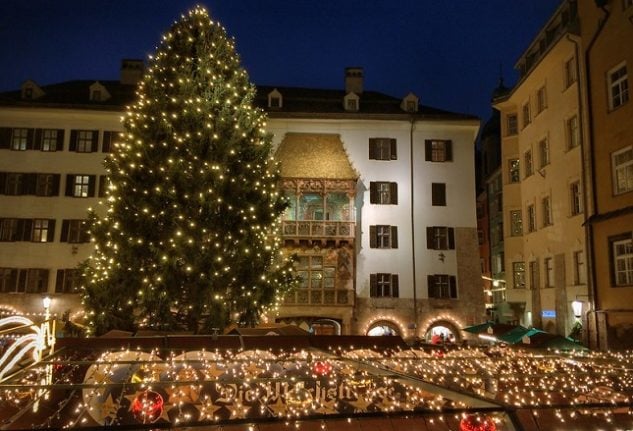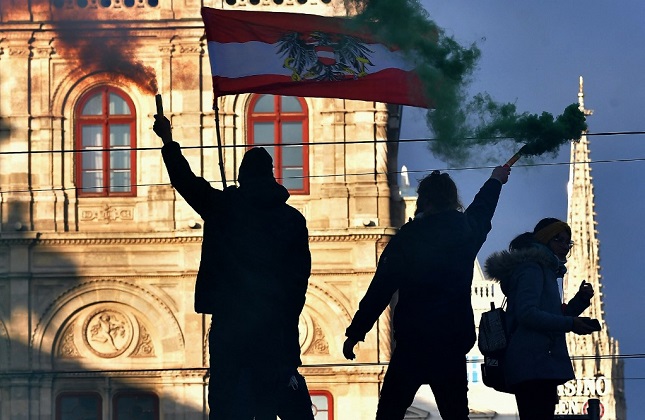After the annual Christmas markets (Weihnachtsmärkte or Christkindlmärkte) were cancelled in 2020 due to the pandemic, and then again at the end of November 2021 for Austria’s fourth national lockdown, some events are returning from next week.
However, as the Covid-19 situation in Austria is changing on a daily basis, the information in this guide could change. You can stay up-to-date on Austria’s Covid news by checking thelocal.at/tag/covid-19 for the latest information or by signing up for our free daily newsletter.
At the time of publication, the consumption of food and drink in a hospitality setting from December 12th in Austria is only allowed in compliance with 2G rules (proof of vaccination or recovery).
The 2G rule applies from the age of 12, and children aged between 12 and 15 can continue to use tests and will be allowed entry, for example using the Ninja Pass which shows school tests (although in Vienna children aged 12 and 15 can only use a PCR test for entry).
Visitors to Christmas markets across Austria are also advised to keep a distance from others (at least one metre) where possible, to use hand sanitiser and to carry proof of 2G. If anyone is experiencing flu-like symptoms, they are advised to stay home and not visit the markets.
Some regions have additional rules in place for the markets, as outlined below, and in Upper Austria the full lockdown will continue until December 17th, regardless of vaccination status.
READ MORE: Region by region: What’s open and what’s still closed in Austria after lockdown?
VIENNA
Vienna Christmas World on Rathausplatz, 1010 Vienna
Vienna’s largest market promises a “fairytale Christmas world” with 150 stalls selling gifts, tree decorations, culinary treats, drinks and snacks. There is even a ferris wheel and light installations for kids in the Children’s World, and a huge Christmas tree on Rauthausplatz.
When: December 13th-December 26th.
Rules to be aware of: The 2G rule applies to the main market, the ferris wheel and the Wiener Ringelspiel for people aged 16 and over.
Christmas Village on Maria-Theresien-Platz, 1010 Vienna
Vienna’s Christmas Village is located between the Kunsthistorisches Museum Vienna and the Naturhistorisches Museum Vienna. It has more than 70 stalls selling handicrafts and traditional gifts, but there is no programme of live events this year due to Covid-19 restrictions.
When: TBC.
Rules to be aware of: Proof of 2G must be provided at food and drink stalls where products are consumed.
Christmas Market at Schönbrunn Palace, 1130 Vienna
For a family-friendly Christmas market with an imperial backdrop, this is the place to visit in Vienna. The Schönbrunn market has more than 60 exhibitors from Austria and neighbouring countries, and an extensive children’s programme, including a Christmas workshop.
When: December 13th-December 26th.
Rules to be aware of: Visitors will need to show proof of 2G. Additionally, no dogs or bicycles are allowed in the Schönbrunn area.
READ ALSO: 12 things you only get once you’ve celebrated Christmas and New Year in Austria
CARINTHIA
It is not yet known if Carinthia will keep regional restrictions beyond the national ones after December 12th. We should find out more soon.
Neuer Platz, Klagenfurt
This is the biggest market in the region with around 50 stalls planned. The city centre will be embellished with lights while stalls offer local delicacies, knitwear, and festive ornaments. Tuesdays and Thursdays are extra special with live music on offer. Elsewhere in the city, market stalls are located at the Domplatz (November 25th-December 19th, Thursdays to Sundays).
When: TBC.
Rules to be aware of: 2G rules apply.
Pörtschach Advent Market, Wörthersee
Called ‘Silent advent by the sea’ this is a Christmas market with a difference, with the focus firmly on tradition and tranquility. Visitors can enjoy warming up around an open fire pit and families can sample the children’s programme.
When: TBC.
Rules to be aware of: 2G rules apply.
TYROL
Christmas Market at Marktplatz, Innsbruck
This is billed as a family-friendly Christmas market with a merry-go-round and puppet theatre for kids, as well as 68 stalls selling crafts, decorations and festive food and drink for adults. Unfortunately, Innsbruck’s Christmas markets in the Old Town and Maria-Theresian Strasse have been cancelled.
When: December 12th-December 23rd.
Rules to be aware of: 2G rules apply and visitors will be given a wristband.
Panorama Christmas Market, Hungerburg
With 360-degree views across the city of Innsbruck from the Hungerburg cable car station, this is a unique Christmas market. Visitors can take the Nordkettenbahnen from the Congress lift station in the city centre to reach the market within eight minutes.
When: December 12th-January 6th.
Rules to be aware of: 2G rules apply and visitors will be given a wristband.
Christmas Market, Kitzbühel
Kitzbühel is the ski resort town famous for the downhill Hahnenkamm race and every year it holds a traditional Christmas market to coincide with advent season. In fact, it’s even marketed as “Christmas like it used to be”.
When: December 13th-December 26th (Wednesday to Sunday).
Rules to be aware of: 2G+ rules apply (negative test even when vaccinated or recovered) and visitors will be given a wristband. Random checks might be carried out.
READ ALSO: Frosty German words and sayings to use this winter
SALZBURG
The Hohensalzburg Fortress Advent Market in Salzburg has been completely cancelled for 2021.
Christkindlmarkt at Residenzplatz, Andreas Hofer Straße 12
The Christkindlmarkt in Salzburg has been running for 48 years. A highlight this year will be an 80-year-old spruce Christmas tree from the Flachgau district. The tree will be lit for the first time on November 18th when the market is officially opened to the public.
When: December 12th-January 1st.
Rules to be aware of: 2G rules apply.
Schloss Hellbrunn, Fürstenweg 37
At Schloss Hellbrunn, more than 700 conifers are decorated with lights and decorations, and the 24 palace windows are transformed into a giant advent calendar. This market is particularly popular with families who enjoy visiting the eight-meter-tall Christmas angel.
When: TBC.
Rules to be aware of: 2G rules apply and visitors will be given a wristband. Visitors have to register online in advance (no group registration allowed, apart from families living in the same home).
STYRIA
At the time of writing, decisions were still being made about when to open Christmas markets in Styria. Events in Voitsberg and Pürgg have already been cancelled.
Advent Market in front of City Hall, Graz
The Graz Advent Market is described as a “welcoming village of stalls”. Visitors can buy handicrafts and treats, or sample the local festive drink Feuerzangenbowle – a blend of mulled wine and rum. The market takes place at the Hauptplatz in front of the Rathaus (Town Hall).
When: TBC.
Rules to be aware of: 2G rules apply.
Christmas Market on Glockenspielplatz, Graz
This is Styria-themed Christmas market with stalls selling local specialities, home-made arts and crafts, mulled wine and punch.
When: TBC.
Rules to be aware of:2G rules apply.
Advent in Leoben, Hauptplatz, Leoben
The Christmas market in Leoben’s main square promises a traditional and magical experience for visitors. There are stalls selling gifts, drinks and snacks, and a special event on December 5th when Santa and the Krampus will hand out gifts to children.
When: TBC.
Rules to be aware of: 2G rules apply.
VORARLBERG
The Christmas market at Kornmarktplatz in Bregenz has been cancelled. Smaller markets in the province could be operating from next week.
A full list of planned Christmas markets in Vorarlberg can be found here.
BURGENLAND
Christmas markets throughout Burgenland have been cancelled due to Covid-19.
UPPER AUSTRIA
Upper Austria is in full lockdown until December 17th. At the time of writing, most planned Christmas markets in the province have been completely cancelled.
LOWER AUSTRIA
Many Christmas markets in Lower Austria have already been cancelled as a result of the ongoing pandemic, including the market on Rauthausplatz in Sankt Pölten and in Johannesbachklamm.
Other markets in the province had delayed the opening due to the national lockdown. Further information can be found here.



 Please whitelist us to continue reading.
Please whitelist us to continue reading.
Member comments